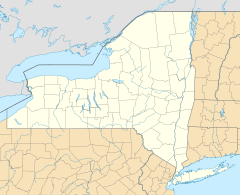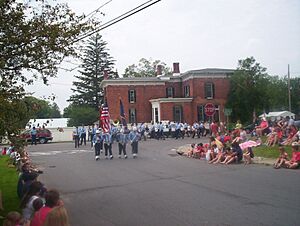Norwood, New York facts for kids
Quick facts for kids
Norwood, New York
|
|
|---|---|
|
Village
|
|
| Country | United States |
| State | New York |
| County | St. Lawrence |
| Area | |
| • Total | 2.26 sq mi (5.86 km2) |
| • Land | 2.10 sq mi (5.43 km2) |
| • Water | 0.17 sq mi (0.44 km2) |
| Elevation | 331 ft (101 m) |
| Population
(2020)
|
|
| • Total | 1,552 |
| • Density | 740.81/sq mi (286.05/km2) |
| Time zone | UTC-5 (Eastern (EST)) |
| • Summer (DST) | UTC-4 (EDT) |
| FIPS code | 36-54012 |
| GNIS feature ID | 0976744 |
Norwood is a small village in St. Lawrence County, New York, in the United States. It's a fun place with a rich history. In 2020, about 1,552 people lived here.
Norwood is special because it's located in two different towns at once: Potsdam and Norfolk. It's also just east of the village of Potsdam.
Contents
History of Norwood
The area where Norwood is now was once called "Raquetteville." It started growing in the 1870s, becoming a separate community from nearby Potsdam.
How Norwood Got Its Name
In 1871, this growing community was named Potsdam Junction. But the people living there wanted a unique name. They first thought of "Baldwin," but there was already a post office with that name. So, on April 15, 1875, they chose the name Norwood.
Today, the mayor of Norwood is Tim Levison.
Historic Buildings
A famous old building in Norwood is the Benjamin Gordon Baldwin House. It was added to the National Register of Historic Places in 2004. This means it's an important historical site worth protecting.
Geography of Norwood
Norwood is located in northern New York State. It covers a total area of about 2.3 square miles (5.86 square kilometers). Most of this area is land, with a small part being water.
The Raquette River
The village is built right along the Raquette River. This river flows through the heart of Norwood, adding to its natural beauty.
Roads and Travel
The main road that goes through Norwood is New York State Route 56. It's also known as North/South Main Street. Other roads, like County Road 35 and County Road 48, also connect to the village. These roads help people travel in and out of Norwood.
Norwood's Population
Norwood has seen its population change over the years. Here's a quick look at how many people have lived in the village:
| Historical population | |||
|---|---|---|---|
| Census | Pop. | %± | |
| 1880 | 1,221 | — | |
| 1890 | 1,463 | 19.8% | |
| 1900 | 1,714 | 17.2% | |
| 1910 | 1,993 | 16.3% | |
| 1920 | 1,808 | −9.3% | |
| 1930 | 1,880 | 4.0% | |
| 1940 | 1,905 | 1.3% | |
| 1950 | 1,995 | 4.7% | |
| 1960 | 2,200 | 10.3% | |
| 1970 | 2,098 | −4.6% | |
| 1980 | 1,902 | −9.3% | |
| 1990 | 1,841 | −3.2% | |
| 2000 | 1,685 | −8.5% | |
| 2010 | 1,657 | −1.7% | |
| 2020 | 1,552 | −6.3% | |
| U.S. Decennial Census | |||
In 2000, there were 1,685 people living in Norwood. Most people in the village were white. A small number of people were African American, Native American, or Asian.
Families and Age Groups
Many households in Norwood are families. About 30% of households had children under 18 living with them in 2000. The population is spread out across different age groups, from young people to seniors. The average age in the village was 38 years old.
The Norwood Brass Firemen
One of the most unique and famous things about Norwood is the Norwood Brass Firemen band. This is a brass band made up mostly of volunteer firefighters! Fred Morgan started the band in 1945, and they have been playing music for many people ever since.
Famous Performances
The Brass Firemen have played in many important places:
- In 1979, they played in Albany, New York, and their performance was shown on TV across the state.
- In 1980, they were invited to play in Washington, D.C. They performed on the steps of the Capitol building and at the Lincoln Memorial.
- In 1982, they went back to Washington, D.C., to play for the First Lady, Nancy Reagan.
- In 1983, they played at an international Luge event in Lake Placid, New York. The US Olympic Committee noticed them there.
Olympic Performance
Because of their amazing talent, the Brass Firemen were invited to play at the 1984 Winter Olympics in Sarajevo, Yugoslavia (now part of Bosnia and Herzegovina). They were the Official USA Band for the Opening Ceremonies!
The band plays a special mix of music. They combine New Orleans jazz with military and traditional marching band songs. They call their style "Dixieland jazz, North Country style."
See also
 In Spanish: Norwood (Nueva York) para niños
In Spanish: Norwood (Nueva York) para niños
 | Calvin Brent |
 | Walter T. Bailey |
 | Martha Cassell Thompson |
 | Alberta Jeannette Cassell |



